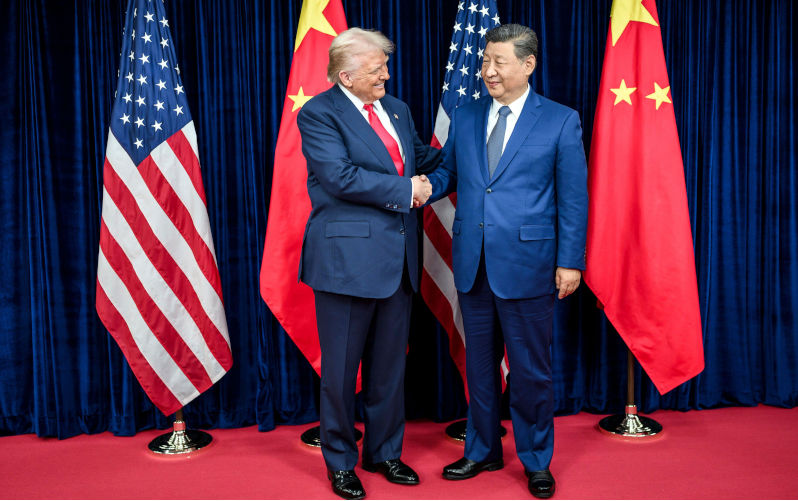After Trump goes home
November 11, 2025
If anyone had any lingering doubts about the change in the world order, the sight of President Trump pumping his fist into the air at the doorway of Air Force One, before turning his back on Asia to fly home, they should be put to bed now.
On those steps, Trump symbolically turned his back on Asia, abandoning the APEC leader’s meeting and vacating the field to the new regional power: China.
Admittedly, Trump has shown little interest in APEC. He skipped the 2018 meeting in PNG, and both Bill Clinton and Barack Obama failed to attend one APEC summit each during their terms due to domestic political crises. The leaders’ meeting was a creation of Paul Keating. It was intended to keep the US engaged at the highest level in East Asia.
On this occasion, Trump travelled to Korea, where the summit was being held, to have a bilateral meeting with Xi Jinping. He had his “12 out of 10” meeting with Xi and abruptly left. All other APEC leaders were there, except Russia’s. Apart from the Korean host’s massive loss of face, Trump’s message to the others was clear: only China matters.
While the details of their meeting are still sparse, the headline outcomes on tariffs, rare earths, fentanyl, soy beans, and so on have been raked over. But little has been said about the historical significance of what transpired.
Importantly, for the first time, China was recognised by the US administration as an equal peer competitor. China now can give as good as it takes, and the US has acknowledged this. Significantly, for the first time, China has been prepared to accept the description of their relationship as the “G2”, managing the global order together. Until now, China has been allergic to this suggestion.
Xi Jinping said that the world is going through changes not seen in a century and the US and China can lead these changes. In 2023, he said something similar to Putin, adding that China and Russia were driving these changes.
This sent the Western commentariat into a spin. Now he has repeated this to Trump who seems to agree with the sentiment. In fact, this has been in Chinese Communist Party doctrine since 2017. Xi rarely, if ever, goes off script.
For Xi, the meeting with Trump, however, would be seen domestically in China as a triumph. And like any politician, this is the most important audience. Since the recent removal of nine senior military figures, Xi’s grip on power has been subject to much speculation. Does this indicate Xi’s continuing strength, or is he under threat? Xi felt secure enough to spend three days at the APEC summit, working the room with other APEC leaders. Whatever doubts there may have been, Xi’s meeting with Trump will make him more secure back at home.
Defence Minister, Marles, in recent days standing next to the US Secretary of War, Hegseth, after their meeting in Malaysia, trotted out the tired hackneyed cliché of Australia and the US “upholding the rules-based order” in the region.
This old shibboleth really means containing China. As admirable as the sentiment might be, it is the US that has done more to undermine the “rules-based” order. Hegseth was noticeably silent.
It is as if Marles and the Australian security establishment haven’t noticed that the world has changed under Trump, something that some analysts warned about even before Trump’s inauguration.
And in case anyone hadn’t been watching, Hegseth, in an X post after meeting Marles, said, “Following President Trump’s historic meeting with Chairman Xi . . . I had an equally positive meeting with my counterpart, China’s minister of national defence . . . and I agree that peace, stability, and good relations are the best path for our two great and strong countries . . . [the] historic ‘G2’ meeting set the tone for everlasting peace . . . for the U.S. and China.”
Rather than working with Australia to maintain the rules-based international order, Hegseth said he and the Chinese defence minister had agreed to “set up military-to-military channels to deconflict and de-escalate any problems that arise”.
Many in the Canberra security establishment and the bureaucracy have failed to understand the nature of great power relations. Instead, they have put excessive weight on allies and alliances, mateship, shared history and values which have made them singularly ill-equipped to grasp the use of power in geopolitics. Trump is like a cold shower.
Thus, the legitimate worry by some that with a return to great power relations between the US and China, Australia would be left on the sidelines like a shag on a rock may have come to pass. Of course, the Trump administration is capricious, volatile and unreliable, but taken at face value, the ground has shifted under the Australian security establishment’s feet.
The Trump administration is less than one year old, and it has re-shaped the global geopolitical order. It is hard to imagine what it will look like after another three years of Trump.
Prime Minister Albanese has shown himself to be adroit in managing these tectonic shifts. He can rightly be pleased with his diplomatic positioning of Australia with both the Trump administration and China’s leaders. His defence and foreign ministers, however, appear to be both out of step and out of time. The world has changed.
This symptom of denial by Marles and Wong is reminiscent of that generation of conservative defence and foreign ministers in the 60s and 70s who refused to accept, even as it was happening before their eyes, that the British world had withered. We are witnessing the very same studied refusal to acknowledge the obvious and to prepare for it.
The views expressed in this article may or may not reflect those of Pearls and Irritations.


